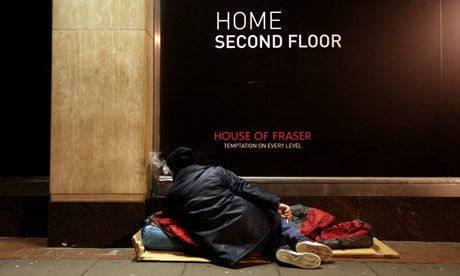There are several different kinds of homelessness. For each person we see on the street there are thousands of people who we don’t see – those living in hostels, shelters and other temporary accommodation. There are people living on friend’s sofas that have no guarantee they’ll be able to stay for another night, and there are more on the cusp, facing being evicted from homes they can no longer afford. The problem is simple enough, not everyone has a secure place to call home, and according to latest statistics this includes over 100,000 children.
Unfortunately, like many problems the solution is more complex. In order to address a problem it is important to understand the causes of the problem, in cases of homelessness causes often come down to many varied factors which are interlinked, meaning that it can be hard to know where to begin.
| Economic |
|
| Political |
|
| Social |
|
With emergency housing being expensive and providing no long-term solution, surely the answer is for the government to build new homes?
In an ideal world, it would be, but unfortunately we have limited resources that are always the topic of political debate (look at the current Junior Doctors Row for example, or to see what other things housing is competing for funding with, see what your, or your families taxes are being spent each day).
This year in London affordable house building stands at less than a third of government targets. On top of this housing charity Shelter argue that the targets were already too low, and even if targets were being hit, houses are not built overnight – what would happen to those who are already experiencing homelessness?
People sleeping rough is an issue that fires something up in me, and let’s be honest, it’s probably only because it’s something I see every day and I hate the sense of guilt I get. I hate the cold and the thought of having to sleep outside frightens me.


At the start of the year I directed a play called ‘Keep Your Coins’ at the Camden People’s Theatre. We interviewed people sleeping rough in London and recorded the audio of the interviews so that the performance could be done in verbatim style. These means actors used the precise words of the interviewees and additionally matched their tone, dialect, pace, pauses and pitch – it was as though the people themselves were on stage and at times made it quite difficult to watch.
The amount of drug and alcohol abuse amongst our interviewees didn’t surprise me in the slightest, and I have no judgement on that. What was unexpected though was how many of our interviewees had experienced the death of a parent. It didn’t always seem like the obvious link as to how they came to be homeless but it definitely had an impact.
After finishing the project I can’t tell you what you should do to help stop homelessness but I do have a better idea from when I started. I hope this is useful and if you have any more ideas please share them:
MONEY:
Giving someone on the street money is short term – it might stop you feeling guilty but will it help that person in the long run? For a more lasting impact donate the amount you would have given to a housing charity (such as Crisis, St Mungo’s Broadway or Shelter)
VOLUNTEERING:
Homelessness charities are inundated with volunteers at Christmas – most of them even have a waiting list. Ask your local charity what they need help with and see what opportunities to get involved exist throughout the year and even better, try and use a talent or passion of yours if you can. That way you’re more likely to stick to it and there’s nothing more rewarding you can do.us leo.
KNOWLEDGE BUILD:
Knowledge is power. The more you know, the more you can do and the great thing about knowledge is you can share it. Find out the latest on what’s going on as well as recent history and how other countries deal with the issue. Media attention can sway decision makers so be loud too.
GIVING:
Ask someone you want to help what they would like! One girl I spoke to in the summer had no clothes and it was so easy to help her out. However, another chap we spoke to was given so many winter coats he had to throw them away. If you know what the person wants it won’t go to waste and it’s a great way to start a conversation
If you work for a place that sells food and there are a few leftovers, by all means hand them over. But what you deem as ‘nice’ such as a spiced latte or a sushi platter won’t always go down well. Simple food is appreciated!
SPEAKING UP:
It’s so easy to feel powerless in the face of homelessness. However, one of the best things I learned was in London we have a number to call: 0300 500 0914. The service is called Streetlink run by No Second Night Out. You tell them about someone you’ve seen sleeping rough and a member of their team goes out to visit them and works with them going forward. If you’re not in London, speak to a local charity about who you can contact when you see someone sleeping rough.
It’s not true that you need a registered address to vote, but most people experiencing homelessness don’t know that and even if they do they might not be motivated to vote (less than 10% voted in the last election). That means that people experiencing homelessness aren’t being represented so write to your local MP asking them what they’re doing to help tackle homelessness and show your support
Finally, it’s worth saying that it can be very tempting to want to change somebody’s life, particularly when you see their loss of dignity. However, on top of change having to come from within that person, it is unlikely that you will be able to provide what that person needs in the long term. So if you feel passionate and reared up, show your local charity you’re here to help.

